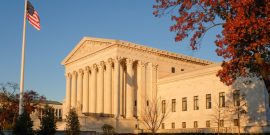The real lesson of Janus is that the Court is no longer infatuated with the National Labor Relations Act and its doctrinal baggage.
Carl Auerbach, RIP
Most people reading this will probably not have heard of Carl Auerbach, who died this week at the age of 100, but he was a great and beloved man.
Carl had a long and important life, including being the Dean of the University of Minnesota Law Schools. He was a close adviser to Hubert Humphrey and probably would have been Attorney General had Humphrey not lost to Nixon in 1968. Carl accomplished many things in his career, including publishing the first textbook on the legal process and participating in the classic Skidmore case. He was also a kind of Forrest Gump of the 20th century, knowing many of the famous people. For example, Richard Nixon worked for Carl at the end of World War II.
But for me, Carl was a special colleague, someone who was very much a father figure to me in academia. Carl was the consummate academic, one who insisted on rigor from other academics (as well as from himself).
Carl had very different political views than me, which made our relationship all the more special. Carl was both a socialist (his term) and an anti-communist. Carl used to regale us with stories about this, even though many of us had a hard time accepting his position. After all, we had seen so many socialists who were fellow travelers with communists or at least anti-anti-communists. But Carl was the real deal. Carl had grown up in an anti-communist family and he watched in post World War II Germany as the Russians took advantage of the West. His views were not welcome to the powers that be and eventually he left for academia. But not before this Forrest Gump met General Patton.
Carl’s views were that of a New Dealer. You could largely predict his views by considering what the New Deal position was on some issue. I found it funny, but of course we all have this tendency. My views are probably pretty predictable based on the politics of the 1980s.
More than anything, Carl was someone who reinforced one of the most important lessons: that one’s politics, even in academia, are not everything. Carl embraced me, despite our political differences, and I always thought of him as a model of how to behave. He was a great man. We shall not soon see his like again.

